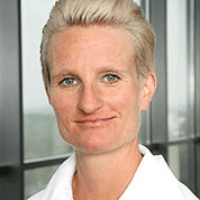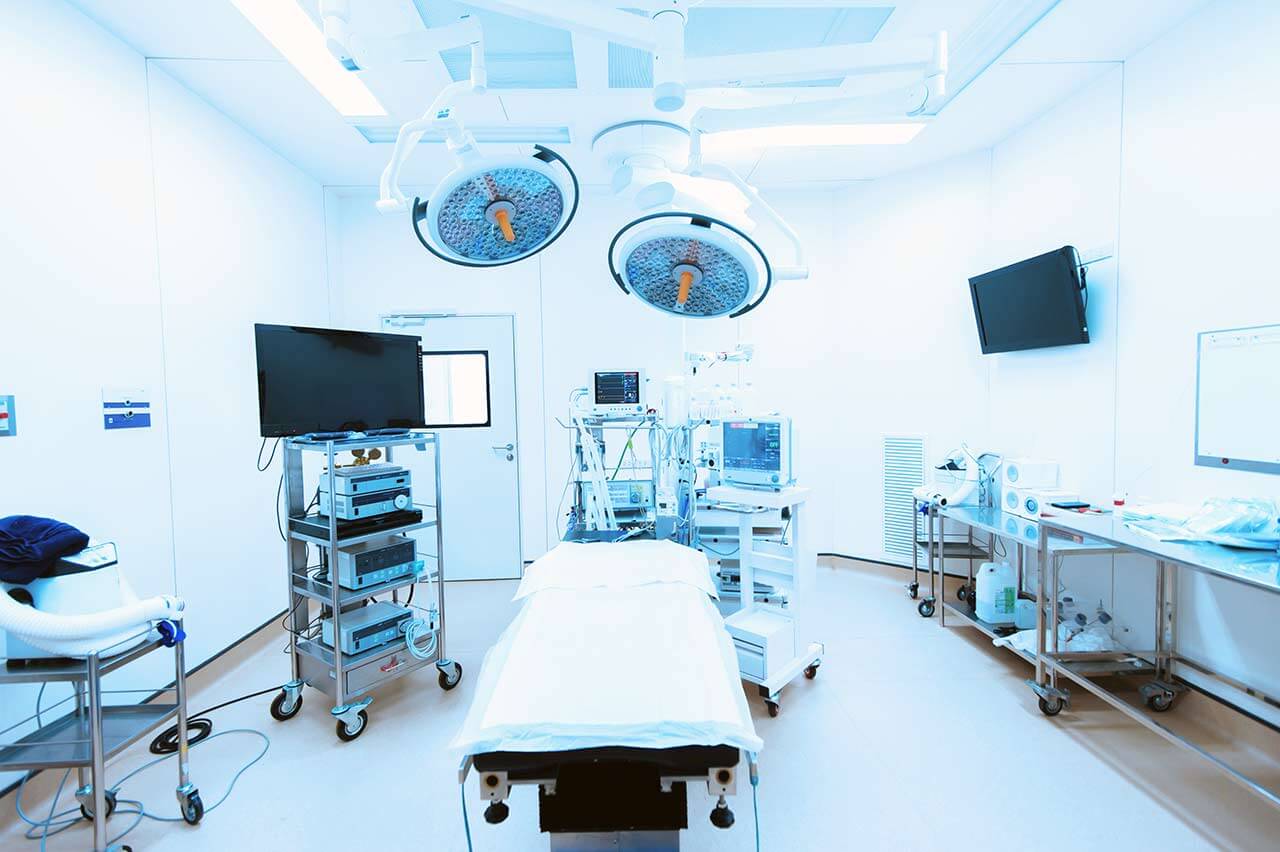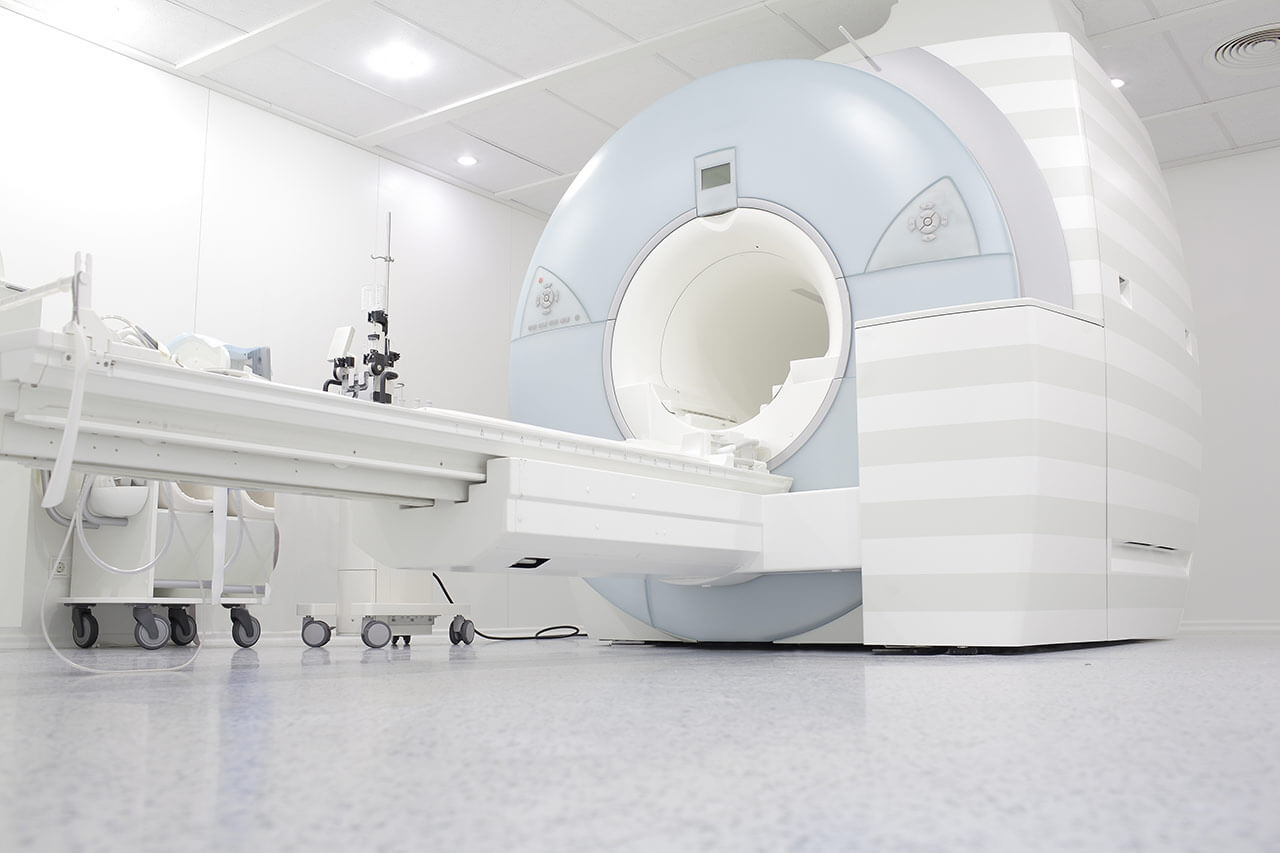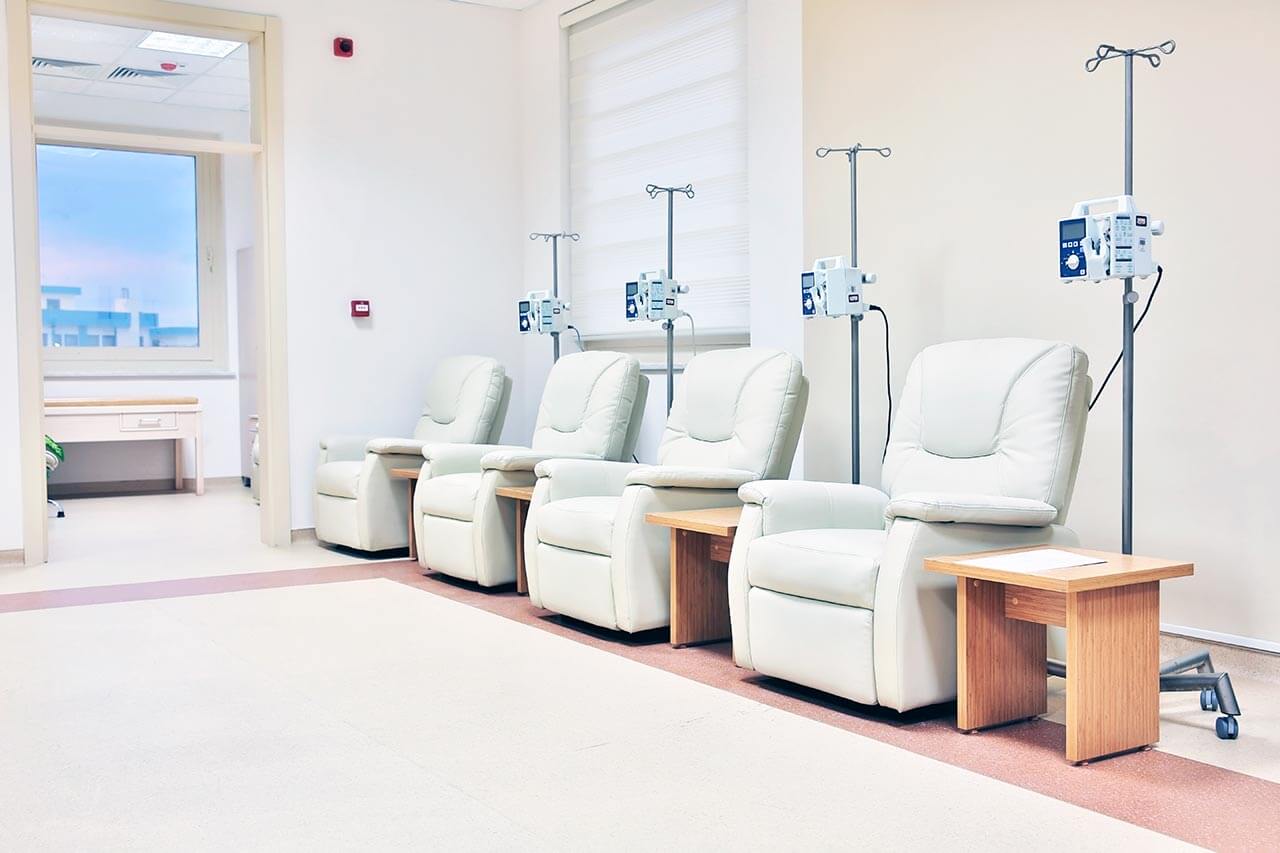
The program includes:
- Initial presentation in the clinic
- clinical history taking
- general clinical examination
- laboratory tests:
- complete blood count
- biochemical analysis of blood
- tumor markers
- indicators of inflammation
- indicators of blood coagulation
- ultrasound of thymus
- CT scan/MRI (on indication 650/ 1200 €)
- biopsy of tumor with histological examination (on indication 2000 €)
- consultation of related specialists
- consultation of the chief physician and all leading experts
- nursing services
- development of individual treatment plan
- written statement
Required documents
- Medical records
- Chest MRI/CT scan (not older than 3 months)
- Biopsy results (if available)
Service
You may also book:
 BookingHealth Price from:
BookingHealth Price from:
About the department
The Department of Thoracic Surgery at the Hospital Nordwest Frankfurt am Main offers all the options of modern medicine for the surgical treatment of diseases of the lungs and other respiratory organs. The team of the department's surgeons specializes in minimally invasive thoracic interventions, surgery to remove lung metastases, including with a laser, as well as in palliative surgery. The primary focus of the department's clinical practice is the surgical treatment of lung cancer and the removal of lung metastases, the surgical treatment of malignant tumors of the mediastinal organs, chest wall and pleura. It should be noted that the department is certified as the Lung Cancer Center by the German Cancer Society. The department successfully performs surgery to correct pectus excavatum and pectus carinatum, surgery for benign neoplasms and infectious diseases of the respiratory organs. The patients are provided not only with impeccable medical services, but also with responsive care. The Chief Physician of the department is Dr. med. Stefanie Veit.
The department's specialists keep pace with innovations, so minimally invasive surgery is the standard of surgical treatment here. The operating rooms of the medical facility have state-of-the-art equipment, which allows the doctors to perform video-assisted thoracoscopic surgery even in particularly complex clinical cases. The main advantage of video-assisted thoracoscopic surgery (VATS) is that there is no need for thoracotomy, which is inevitable in case of classic open surgery. When performing sparring interventions on the thoracic organs, surgeons make only 2-3 small skin incisions with 1-2 cm in size, through which they deliver a miniature camera and special surgical instruments to the pathological focus. The image of the operating field is displayed on a large screen with multiple zooming, so the surgeon can clearly see the tiniest anatomical structures. Video-assisted thoracoscopic surgery allows the doctors to avoid trauma to healthy tissues and, accordingly, contribute to the rapid recovery of the patient after the operation. The team of the department's thoracic surgeons treats most tumors of the respiratory organs using the innovative VATS surgical technique. It is noteworthy that the extensive clinical experience of the doctors allows them to perform video-assisted thoracoscopic surgery even to resect tumors at the advanced stages. The department's specialists also successfully perform lobectomy (removal of a lung lobe) using VATS.
As a certified Lung Cancer Center of the German Cancer Society, the department is distinguished by its particular competence in lung cancer treatment. When admitted to the department, a patient with suspected lung cancer undergoes comprehensive diagnostics, including endoscopic and imaging tests, pulmonary function tests and other necessary diagnostic procedures. If the diagnostic results confirm the presence of a malignant lung tumor, then thoracic surgeons jointly with pulmonologists, oncologists and radiation therapists begin to elaborate the most effective treatment regimen. The tasks of thoracic surgeons include the selection of the optimal type of a surgical procedure for tumor resection. Depending on the particular clinical case, the surgical treatment can be complemented by chemotherapy, radiation therapy, combined chemoradiation therapy, immunotherapy using checkpoint inhibitors and other therapeutic options. Respiratory therapy is used as a supportive measure. During the entire therapeutic process, the patients are supported by psychologists, since most of them are unable to cope with an emotional shock on their own and set themselves up for a favorable treatment outcome.
The department's range of medical services includes:
- Surgical treatment of lung cancer (small cell and non-small cell lung cancer)
- Lobectomy (removal of a lobe of the lung)
- Bilobectomy (removal of two lobes of the lung)
- Pneumonectomy (total removal of the lung)
- Surgery to remove ribs and parts of the diaphragm
- Video-assisted thoracoscopic surgery
- Chemotherapy and radiation therapy (in collaboration with highly specialized experts)
- Surgical treatment of malignant tumors of the mediastinal organs, chest wall and pleura
- Surgical treatment of lung metastases, including laser surgery
- Lateral thoracotomy
- Median sternotomy
- Lymph node removal surgery
- Video-assisted thoracic surgery
- Surgical treatment of mediastinal diseases (for example, thymoma, lymphoma, germ cell tumors)
- Video-assisted thoracic surgery
- Surgical treatment of chest wall tumors
- Video-assisted thoracic surgery
- Palliative surgery (for example, pleurodesis, long-term pleural drainage, stent implantation, laser therapy, cryotherapy)
- Surgical treatment of infectious diseases (for example, pleural empyema, lung abscess, chronic infectious diseases with the destruction of lung tissue)
- Surgical treatment of benign diseases of the lungs, mediastinal organs and chest wall (for example, hamartomas, bronchiectasis, pulmonary emphysema, lung cysts, pulmonary sequestration)
- Surgical treatment of tracheal diseases (for example, tracheal stenosis, tracheal tumors)
- Surgical treatment of thoracic injuries (for example, hemothorax, rib fractures)
- Video-assisted thoracic surgery
- Surgical treatment of pneumothorax
- Video-assisted thoracic surgery
- Surgical treatment of pectus excavatum and pectus carinatum
- Minimally invasive surgery
- Surgical treatment of hyperhidrosis
- Video-assisted thoracic surgery
- Surgical treatment of other diseases of the respiratory system
Curriculum vitae
Higher Education and Professional Career
- Since 2016 Chief Physician of the Department of Thoracic Surgery at the Hospital Nordwest Frankfurt am Main.
- 2015 Senior Physician with managing responsibilities, Lung Center, Sana Hospital Duesseldorf.
- 2012 Grant in the field of surgical correction of thoracic defects, Istanbul and Windsor.
- 2011 Chairman of the Working Group on Minimally Invasive Thoracic Surgery of the German Society for Thoracic and Cardiovascular Surgery.
- 2010 Senior Physician in the Department of Thoracic Surgery at the Robert Bosch Hospital, Stuttgart.
- 2008 Grant in VATS lobectomy, Cedars-Sinai Medical Center, Los Angeles.
- 2007 Board certification in Thoracic Surgery.
- 2003 Assistant Physician in the Department of Thoracic Surgery at the Robert Bosch Hospital, Stuttgart.
- 2002 Doctoral thesis defense in medicine.
- 2001 Internship, Department of General and Abdominal Surgery, Marienhospital Stuttgart.
- 1999 - 2000 United States Medical Licensing Examination (USMLE).
- 1994 - 2000 Study of Human Medicine at the Faculty of Medicine, Julius Maximilian University of Würzburg.
Clinical Interests
- Minimally invasive lung cancer surgery.
- Minimally invasive surgery to remove thymoma.
- Surgical removal of thoracic metastases.
- Correction of pectus excavatum.
- Hyperhidrosis treatment.
Photo of the doctor: (c) Krankenhaus Nordwest
About hospital
According to the reputable Focus magazine, the Hospital Nordwest Frankfurt am Main ranks among the top German medical facilities!
The hospital has a reputation of a modern multidisciplinary medical center with excellent quality of services. The medical complex is an academic hospital of the Goethe University Frankfurt, thanks to which it provides patients with treatment based on the very latest achievements of university medicine. The hospital has 12 specialized departments, as well as numerous narrowly focussed centers and institutes, whose doctors work hand in hand for the benefit of their patients. The hospital has 582 beds. The medical staff of the hospital annually provides diagnostics and treatment to more than 21,800 inpatients, while over 36,000 patients receive medical care on an outpatient basis.
The hospital presents such medical fields as oncology and hematology, radiation oncology, gynecology, urology, neurology, internal medicine, general and abdominal surgery, thoracic surgery, vascular surgery and others. Each of these medical fields is represented by a professional team of doctors and nursing staff. Oncology is one of the priority focuses of the hospital. In 2008, the Johann Wolfgang Goethe University Hospital Frankfurt together with the Hospital Nordwest Frankfurt am Main founded the University Cancer Center Frankfurt recognized by the German Cancer Aid as one of the best in Germany. In this high-tech center, the patients receive effective interdisciplinary medical care, since not only oncologists, chemotherapists and radiation oncologists are involved in the therapeutic process, but also specialists from related disciplines, including gynecologists, urologists, gastroenterologists, pulmonologists, surgeons and other experts. The patients are also provided with qualified psychological care, which is an integral part of the successful cancer treatment. Thanks to its status as an academic hospital, the medical facility gives patients the opportunity to participate in clinical trials at both national and international levels.
The hospital is proud of its health facilities and state-of-the-art equipment, which plays an important role in the effective diagnostics and treatment. For example, since 2016, the Department of Radiation Oncology has been using cutting-edge Truebeam STx NOVALIS linear accelerators from VARIAN and Brainlab, which allow the doctors to provide highly effective, but very sparing, radiation therapy for cancer treatment. Despite the presence of modern medical technologies in the hospital, the focus of the doctors is on the patient with his individual needs and wishes. The specialists pay attention to creating a friendly atmosphere in the hospital and always demonstrate humanity in relation to their patients.
The outstanding clinical activities of the medical complex are awarded by many prestigious certificates, including certificates of the German Cancer Society in the treatment of bowel, liver, prostate, gynecologic cancers, etc. The Aktion Saubere Hände certificate and a modern quality management system guarantee patients the highest safety standards during both diagnostic and therapeutic procedures.
Photo: (с) depositphotos
Accommodation in hospital
Patients rooms
The patients of the Hospital Nordwest Frankfurt am Main live in comfortable single and double rooms, corresponding to the level of a top-class hotel. Some single rooms have large panoramic windows offering beautiful views of the city of Frankfurt.
The patient room furnishing includes an automatically adjustable bed, a bedside table, a wardrobe with a built-in safe, a desk with a chair and a reading lamp, a TV, a telephone and a mini-fridge. The patient rooms have Wi-Fi (at an extra fee). All patient rooms have an ensuite bathroom with shower and toilet. In the bathroom one can find changeable towels, a bathrobe, a hairdryer and toiletries.
The hospital has a cafe on its territory, where one can not only have a tasty snack, but also buy newspapers, magazines, personal hygiene products, drinks, sweets and much more.
Meals and Menus
The patients of the hospital are offered delicious and varied three meals a day: breakfast, lunch and dinner. Meals are served to patients in their room. During the day, the patients are provided with fresh fruits, juices, coffee, tea and mineral water.
If you are on a specific diet for some reason, you will be offered an individual menu. Please inform the medical staff about your dietary preferences prior to the treatment.
Further details
Standard rooms include:
Religion
The religious services are available upon request.
Accompanying person
During the inpatient program, the accompanying person can live with the patient in a patient room or a hotel of his choice. Our managers will help you choose the most suitable option.
Hotel
During the outpatient program, the patient can stay at the hotel of his choice. Our managers will help you choose the most suitable option.





